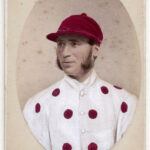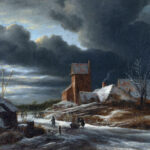18 September 1831: William Wallett, an unemployed Hull clown, sets out to walk from Tickhill to Doncaster for the St Leger in home-made clothes
William Frederick Wallett. 1870. The Public Life of W.F. Wallett, the Queen’s Jester. Ed. John Luntley. London: Bemrose and Sons. Get it:
.Unedited excerpt
If an excerpt is used in the book, it will be shorter, edited and, where applicable, translated.
I was once more cast adrift on the world. So with a light heart and empty wallet I made my way to Tickhill, Yorkshire, known over the country side as Tickhill-God-help-me-where-all-the-poor-creatures-come-from.” Here I found my old friend and manager, Mr. Abbott, who again received me with a warm welcome. But as you may guess from the name of the town, business was far from prosperous. In fact, before the end of the season we were reduced to starvation point. There I became companion and shared bed and crust with a brother of a late lamented judge, who was acting under the name of Belgrave. We were driven to extremities when another farmer proved a friend in need. He sent us a piece of home-fed bacon, which was hailed with rapture. We did not eat it, it was far too valuable. It was placed in a three-legged iron pot, from which it was never removed. Any vegetables we could obtain were added from day to day, so our stock pot never failed, neither was the bacon sensibly diminished.
By this time the gloss had worn off our apparel, and we presented what is called a “seedy” appearance. Just then my friend Belgrave received a large parcel from London, containing blue broad cloth sufficient for a suit of clothes, and an old-fashioned silver watch, an heir-loom apparently by its antique look, round as a turnip, with black hands and a very dirty face. Watches of the same class may be bought in Tottenham Court Road by the bushel. There was the cloth, but how was it to be made up, and where were the trimmings to be got? which in those days would cost as much as an entire suit does now, cloth included. Necessity proved the mother of invention, so I suggested the possibility of finding a tailor who would make the clothes, and take the watch in payment. This was soon arranged, and the suit was made. A hat was forthcoming; but what about the boots to match? For his only pair was in a deplorable state. It happened during my employment as artist to the establishment, that I had to mount to a beam of the barn to adjust the scenery. There I met with a treasure-trove in the shape of a large pair of leather hedging mittens, with gauntlet tops thick enough for soles. Delighted with the discovery, I rushed home to my companion shouting, Eureka! By means of a broken fork and some taching ends that I begged from a benevolent cobbler, I soled my friend’s boots. This occurred two days before the St. Leger at Doncaster. I had no new suit; but with the assistance of a pound of logwood and alum in proportion, I managed to give my slate coloured clothes somewhat of a healthy and natural complexion. My hat had assumed chameleon hues, like hats at watering places which have suffered a sea change, and vary their colours with every movement of their wearers’ heads. By a process known among the Jews as “clobbering,” I restored the old hat to almost its pristine beauty. It really looked well. Even Davy Hewitt, my old friend and brother actor, might have been proud of its wonderful restoration. We were now equipped for our trip to Doncaster. It was a lovely morning when we started, but we had scarcely proceeded three miles before the rain began to descend in earnest. Umbrellas we had none, so we were exposed to the pitiless storm. I left Tickhill gloveless, but the action of the rain upon my dyed garments soon furnished me with blue gloves, tipped with purple. My white shirt became an odd spectacle, being adorned with all manner of grotesque figures of strange colours like those on the dresses of the Chinese. My face assumed a colour from which my eyes had a blue look-out. Poor Belgrave laughed heartily at my transformation. His mirth however was soon checked. The leather with which I had soled his boots, though thick, was soft and porous, and through tramping in the mud, had become saturated. While travelling over the soft roads no particular inconvenience resulted; but oh, how different on the paving stones at the entrance of Doncaster! His sodden soles adhered to the pavement like the suckers used by boys, so that he found it impossible to move without leaving his soles behind. There he stood, and still it rained. Then I laughed; for it was my innings now. There was but one remedy for this fix—to remove the soles upon which I had expended so much time and ingenuity. But how? A knife was wanted, and we tried in vain to borrow one. The bystanders, greatly amused by my absurd figure and the strange position of my companion, replied to our entreaties for the loan of a knife by asking whether we wanted to commit suicide. At last one was procured, and the soles were removed, but so hastily that the in-soles were carried away with them, which converted the boots into gaiters. Thus released, we left the soles and our tormentors behind. In the action of walking, every side of the boot gaiters came in succession to the front. By an unfrequented road we made for the Thorne and Doncaster Canal, where we expected to meet Captain Barker of the “Speedwell,” packet, a friend and amateur theatrical, from whom we were sure to receive a hearty and hospitable welcome.
But, my luck again! instead of Captain Barker we found on board a temporary captain, a stranger, our friend being detained by illness at Thorne. Our last hope was gone; so being without money or friends, we had to return to Tickhill, not having tasted food since five in the morning. We had walked twenty-five miles through the storm, with (not upon) empty stomachs, and our larder at home could afford us but slight refreshment. At Tickhill once more, our poverty well qualified us to claim the citizenship of that City of Destitution.
Comment
Comment
Thomas Frost comments re two other impresarios:
The haze which envelopes the movements of travelling circuses prior to the time when they began to be recorded weekly in the Era cannot always be penetrated, even after the most diligent research. Circus proprietors are, as a rule, disposed to reticence upon the subject; and the bills of tenting establishments are seldom preserved, and would afford no information if they were, being printed without the names of the towns and the dates of the performances (Frost 1875).
However, the circumstantial evidence provided by Wallett has encouraged me to conjecture the date used in the entry – refutations welcome.
In the 19th century, the St Leger Stakes at Doncaster, Wallett’s destination, was run in September, so we have the month. This episode follows his trip to Gainsborough mart, where he stays in a beer house that opened after passing of the New Beer Act, which came into operation on 11 October 1830. Gainsborough fair commenced on Easter Monday, so at the earliest we’re talking on this evidence is September 1831. Wallett was married to Mary Orme in April 1839 despite the famous protests (perhaps exaggerated or invented for PR) of her father, and my impression is that he is unmarried here, so the latest possible date is probably September 1838.
The itinerant actor-manager William Abbott (?-?) – with whom Wallett had worked, with whom he stayed in Tickhill, and whom he saw for the last time at the end of the chapter – does not help date this episode. Wallett says he is “of the Theatre Royal, Crowle” – a thriving but small Lincolnshire market town – in humorous reference to the famous actor-manager William Abbot(t) (1790-1843), who worked inter alia at the Theatre Royal, Covent Garden, and, like our Abbott, was bankrupted in England and died in the States (but of apoplexy in Baltimore or New York, rather than cholera in St. Louis). William Slout says Wallett spent four years with the Abbotts after starting his theatrical career at Hull in 1830 (Slout 1998), which might suggest September 1835, 1836 or 1837, but I don’t know his evidence.
Cholera may help. If Charley Yeoman really did die of cholera (about?) two months after his split with Wallett at Gainsborough, then he might have been a victim of the second pandemic, then this might confirm September 1832 as the sole candidate: cholera was only general in England in summer and autumn of 1832 (Underwood 1947/11/03) – see e.g. reports of the 1832 St. Leger (Highflyer 1832). But Yeoman might instead have been a victim of indigenous cholera or something similar. I haven’t read anything about cholera in the USA, so can’t comment on the cholera deaths of the Abbotts, apparently in St Louis, Missouri (the famous William Abbott died in New York or Baltimore of apoplexy).
But Wallett mentions having worked for “Little Jemmy Scott’s Coronation Pavilion” under usurper Charley Yeoman at Gainsborough this year, and Frost says Wallett was with Charles Yeoman’s Royal Pavilion in Gainsborough (Frost 1875), suggesting that circus celebrations in Brighton following William IV’s coronation in June 1830 took to the road.
Rain may be our greatest ally. Which Doncaster meeting was marred by rain on the Monday, the day before the St. Leger? 1831 mentions torrential rain on the evening of the day before, which is the one he was travelling on – he completed the outfit two days before – perhaps there were heavy local showers, and he was rained on https://babel.hathitrust.org/cgi/pt?id=nyp.33433066598982&view=1up&seq=450&q1=Chorister No mention of rain
Something to say? Get in touch
Similar
 15 October 1838: Apologies from “imprisoned” Huddersfield workers are read to the great Chartist rally on Peep Green (Hartshead Moor), accusing middle-class radicals of betrayal
15 October 1838: Apologies from “imprisoned” Huddersfield workers are read to the great Chartist rally on Peep Green (Hartshead Moor), accusing middle-class radicals of betrayal 14 September 1864: In his last race, the St Leger Stakes (Doncaster), the legendary Blair Athol faces his great rival, General Peel, in monsoon conditions
14 September 1864: In his last race, the St Leger Stakes (Doncaster), the legendary Blair Athol faces his great rival, General Peel, in monsoon conditions
Comment
Comment
Full article on its way.
Something to say? Get in touch
Search
Donate
Music & books
Place-People-Play: Childcare (and the Kazookestra) on the Headingley/Weetwood borders next to Meanwood Park.
Music from and about Yorkshire by Leeds's Singing Organ-Grinder.




 Bluesky
Bluesky Extwitter
Extwitter